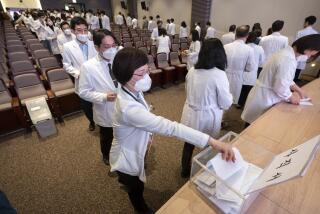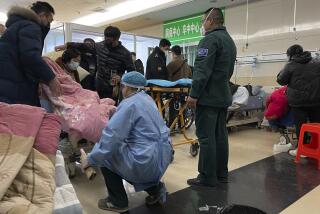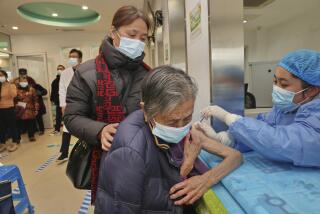2 Hospitals in Shanghai Try Letting People Pick Out MDs
- Share via
SHANGHAI — For many Chinese, the prospect of going to the doctor is worse than getting sick. Decades of command economy and a cradle-to-cremation welfare system have left hospitals in no better shape than any other decrepit state-owned industry. Patients are treated with the bare minimum of care, and few have dared to ask for more.
But with the introduction of free-market reforms, competition and choice are sweeping across every walk of life in the world’s most populous country. Doctors, the loftiest of the “iron rice bowl” generation, are no exception. Now, two trailblazing hospitals in Shanghai have openly declared war on poor service and passing-the-buck attitudes by putting doctors’ fates in the hands of patients.
Instead of waiting in line for an assigned physician, the sick now get to choose who treats them. Posters with doctors’ names, photographs, resumes, specialties and mission statements are plastered on hospital walls like campaign literature. Frequently chosen physicians are awarded bigger bonuses, and the unchosen may be transferred or laid off.
This merit system might sound basic to the average Westerner, but it is one of the many mini-revolutions transforming life for ordinary Chinese caught in the midst of extraordinary social change.
“Before, the doctor was God. Now it’s the other way around,” said Wang Qun, an assistant director at Dachang Hospital in a northern industrial suburb of Shanghai.
As the state gradually eliminates universal health care and encourages heavily subsidized hospitals to become profitable entities, patient satisfaction is fast becoming a critical measure of a hospital’s ability to survive. Already, the ill have been voting with their feet. The end of free health care means that those who can’t afford to pay are staying away and that those who can pay expect quality.
Wang’s hospital adopted the new system in May as a way to halt a plummeting number of patients.
“Our system has not been adjusting to the pace of economic reform,” Wang said. “We cannot afford not to change.”
Pioneering City Has Raft of Doctors
Shanghai, the country’s economic nerve center, is home to more hospitals and physicians than any other major Chinese city. For every 1,000 people in Shanghai, there are 3.85 doctors, more than double the national average of 1.67 per 1,000, according to the Health Ministry.
Competition between doctors and hospitals will only intensify as more and more residents are paying for medical care out of their own pockets or buying their own health insurance. The key for hospital administrators is how to motivate their staffs and mend relationships with patients.
“We are slow to change, but our patients are demanding so much more,” Wang said. “They want to know why is it when they go to a hotel, people greet them as Mr. and Mrs. and say ‘please’ and ‘thank you.’ But when they go to the hospital, they don’t get the same treatment.”
In fact, most city dwellers have become accustomed to the rotten conditions inside one of the last bastions of China’s socialist past. Under a system of low pay and equal distribution, it was not unusual for doctors to be better known for their skills at beer drinking, mah-jongg playing and fist fighting than for any ability to cure illnesses.
Streamlining Staffs Vexes Supervisors
Hospital officials say they are having a hard time streamlining their bloated staffs, despite new laws demanding that doctors without proper degrees be transferred to lower-level jobs. According to a recent survey, if the law was strictly enforced, as many as 6,000 medical professionals in Shanghai would be ousted from their posts because they don’t have proper credentials.
Desperate patients still resort to bribing popular doctors with “red envelopes” stuffed with money, a default quality-control avenue that has resulted in good care’s being out of reach of those who can’t afford it.
Under the new program, being able to choose a doctor doesn’t cost any extra.
“It’s like the hospital is giving out the red envelopes,” Wang said.
And the difference is noticeable.
“We’ve only used this program two months, and already patient attendance is up. A well-liked doctor who saw a maximum of 50 patients a day now could see 90. There is no time to even take bathroom breaks,” said Tang Hongkui, assistant to the director at Shanghai No. 7 People’s Hospital, the first to experiment with the pilot program, in April.
For doctors--and especially younger ones--the workplace suddenly became a pressure cooker. While youth is usually an advantage in other state-owned industries facing massive layoffs, in the medical profession it is the older, more experienced physicians who have a slight upper hand.
Dr. Cao Jingkai and Dr. Wang Kefeng share an office and treat patients from a single desk in Dachang Hospital. But because the 32-year-old Wang has nine additional years’ experience, he’s getting more patients than the 24-year-old Cao, a recent medical school graduate.
“Before this, we had the same number of patients. Now patients prefer to wait in line for someone with more experience,” Cao said. “But I won’t have one year [of] experience forever.”
Down the hall, Dr. Wang Yongxiang and Dr. Zhang Shixian are pod mates. Both are in their 50s, and both have long lines of patients outside. But there is also subtle competition between them. Besides age, patients look for rank. And Wang is a staff physician, while Zhang is a chief in her discipline. Those who care about credentials tend to gravitate toward Zhang, and Wang is keeping pace by improving service as best he can.
“If you don’t want to lose face, then you have to change your attitudes, because patients are always looking to find the perfect doctor,” said Wang, an army-trained physician from a peasant background.
As he spoke, a patient came back complaining that the cold medications he had been prescribed cost too much. Wang crossed out the most expensive item on the list, and the patient walked away happy.
Zhang says credibility isn’t automatic--you have to earn your patients’ trust. That was impossible under the old system. Whom patients saw was random, and they might never see the same doctor twice.
“Doctors also need continuity, to follow up on patients’ progress, so that not all their patients are first-time customers,” Zhang said, counting the day’s tally of patients after treating the last one--a young woman from an inland province who now works at a Shanghai bar. She had always wanted to visit a woman doctor to discuss her “female problems.” Her wish came true when she picked Zhang off the wall.
Longtime residents are also pleased with the new system.
“Service is so much better,” said Dai Guilan, 53, a kindergarten teacher who had come to see Zhang a second time for a persistent sore throat. “When I chose her the first time, I didn’t have time to look at her picture. I figured if I didn’t like her, I wouldn’t choose her next time. But she is very nice, and I kept coming back.”
Dai said the change in doctors’ attitudes has been accompanied by a change in atmosphere at Dachang Hospital, where she has been coming for 20 years.
The hospital used to be so filthy, she said, that the walls were black, and flies and mosquitoes were everywhere. Now the building has been renovated, and the floors are mopped every day. There’s even a little flower garden out front, and there are clean bathrooms inside. Hospital officials have begun a free pickup service to transport patients. A hotline is being set up. And for the first time, all doctors will be given business cards so patients can contact them, even at home.
“Hospitals should be run as a business. That requires a fundamental shift in mind-set,” said Dr. Peng Shaocheng, who just received the license to operate Shanghai’s first private hospital from the ruins of a state-owned outfit, which folded after the factory it was affiliated with went bankrupt and most of the doctors fled. “But the medical field is a brand-new marketplace, and a lot of hospital officials have no idea how the market works.”
While medical facilities around the country are studying the success of this experiment and hoping to follow suit, experts say it’s not a model that would work in some of China’s largest and busiest city hospitals.
In Shanghai, for example, the top-rated medical facilities are already flooded with patients who chose them over lesser-known local outlets. If they allowed patients to select doctors, they would only generate longer lines and less satisfaction, said Lu Jun, a professor at Shanghai Medical University’s department of hospital management.
In addition, many of the best hospitals are important training grounds for doctors. Younger physicians can’t afford to be passed over by patients who prefer only senior doctors.
Most Facilities Need All the Help They Can Get
But those are the exceptions. The majority of China’s hospitals are community-based and need all the help they can get to attract skeptical patients.
Shi Minyao is one of the latter. The former government worker heard about the new system at the No. 7 People’s Hospital and stopped by on a lunch break to check it out for himself.
“I’m interested in their technique, where they went to school and if they had any awards or publications,” Shi said as he studied the colorful charts on the wall on a rainy afternoon. “Before, whom you saw was based on luck of the draw. Now, everything is about economics. If I’m paying for something, it’d better be worth the price.”
More to Read
Sign up for Essential California
The most important California stories and recommendations in your inbox every morning.
You may occasionally receive promotional content from the Los Angeles Times.













